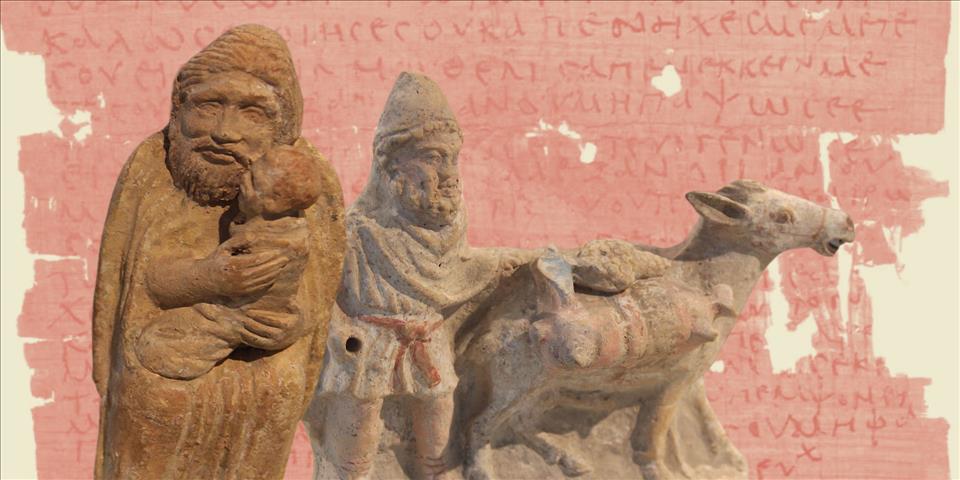
What Were The Greeks And Romans Like? Their Letters Suggest They Weren't So Different From Us
Sometime in the 3rd century AD, in Egypt, a man called Zoilus wrote a letter to his mother Theodora about family news. He had just visited his sister Techosous, who was sick:
National Archaeological Museum of Athens 4BC. George E. Koronaios/Wikimedia Commons , CC BY
We don't know what happened to Zoilus' sister Techosous. No letter about the events that occurred afterwards has been preserved. Maybe Techosous and her baby survived the birth. Maybe not.
Letters like this reveal ancient people's everyday triumphs and tragedies. Brothers worry about their sisters, bosses rage at slack employees and children sulk at their parents.
Zoilus's letter is one of many written by ordinary people from the Greco-Roman world that survive to the present day.
His letter was written in Greek on papyrus, a writing material made from the pith of the papyrus plant. The dry climate of Egypt allowed papyrus letters to survive buried under the ground, until they were excavated by modern researchers.
Detail from the letter of Zoilus to Theodora, 3rd century AD. University of Michigan Library 'I should burn you!'
Ancient papyrus letters from Egypt sometimes preserve evidence of people's strong emotions.
For example, in the 2nd century AD, Diogenes wrote a letter to his employee Apollogenes complaining about his failure to undertake some work:
Other letters also contain strong language. People weren't afraid to hide their feelings.
In the 5th century AD, for example, someone called Valerius wrote a letter to a man named Athanasius calling him“a bad old man, a traitor and a pimp”, adding“I should burn you!”. The letter is only fragmentary. We don't know what prompted Valerius to use this language.
Ancient Roman relief of a mêlée of Romans and Orientals from a sarcophagus. Wikimedia Commons
A famously endearing letter is one written by a boy called Theon to his father in the 2nd or 3rd century AD. Theon was grumpy because his father was not going to take him to the big city, Alexandria :
We don't know if Theon's father gave in and allowed his son to go with him to Alexandria.
Letter from Theon to his father, 2nd or 3rd century AD. Bodleian Library, Oxford Radish oil, bedspreads and other domestic items
The papyri also give us a glimpse of mundane everyday issues.
In the 2nd or 3rd century AD, a woman called Thaisarion – who was pregnant at the time – wrote a letter to her brothers. She talked about how she had seen off their sibling Ptolemaios earlier that day and asked them for various items she needed:
Letter from Lucius to his brother Apolinarius, 2nd or 3rd century AD. Sperlock Museum, University of Illinois Urbana-Champaign
In a different letter of the same period, a man called Lucius wrote to his brother Apolinarius with a culinary request:“If you are making pickled fish for yourself send me a jar too”.
There are also letters in which people describe items they have sent to their addressees.
For example, in the 4th century AD, Psaeis wrote a letter to his wife Isis informing her of the goods she will soon receive:“I sent you two bedspreads, two pounds of purple dye, six baskets, and two towels made by Moueis”.
These letters give us insights into domestic details like what people ate, how they organised their households, and their interactions.
This painting of domestic kitchen items as created by an unknown 1st century AD Roman artist. Stanley A Jashemski/Wikimedia Commons The value of ordinary people's letters
All of this makes the ancient world seem more relatable.
Researchers continue to work actively on excavating and translating this priceless material. Earlier this year, for instance, a trove of new Roman letters from the 1st and 2nd century AD was discovered in a cemetery in Egypt.
The more of these letters we discover from ordinary inhabitants of the ancient world, the more we learn about who they were.

Legal Disclaimer:
MENAFN provides the
information “as is” without warranty of any kind. We do not accept
any responsibility or liability for the accuracy, content, images,
videos, licenses, completeness, legality, or reliability of the information
contained in this article. If you have any complaints or copyright
issues related to this article, kindly contact the provider above.


















Comments
No comment